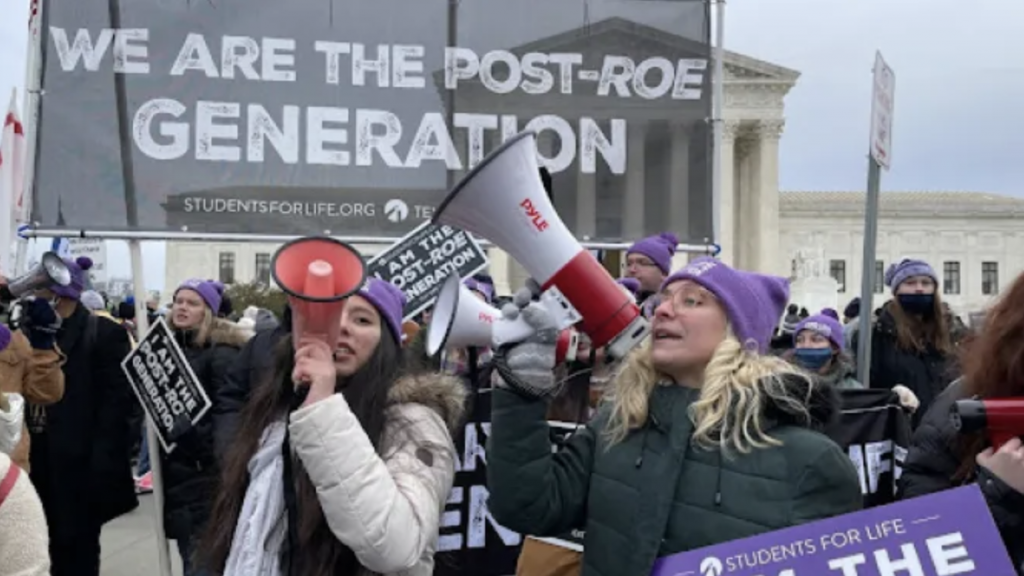The 2023 theme for the annual March for Life was announced Thursday in preparation for the first march after the historic overturning of Roe v. Wade, the landmark 1973 case that legalized abortion nationwide.
The theme of the 50th annual march — which will take place on Jan. 20, 2023 — titled “Next Steps: Marching in a Post-Roe America,” seeks to orient the national pro-life movement as it moves to dismantle abortion across all 50 states.
Jeanne Mancini, March for Life president, said in opening remarks at an event to announce the theme that she believed the testimony of marching every year was critical in changing the hearts and minds of Americans and leading to the reversal of what many deemed to be “settled in law.”
“Your testimony, marching in Washington, D.C., shutting down the city every year for the largest human rights demonstration worldwide has borne fruit!” she told the audience.
“To God be the glory — in overturning Roe; and he uses his faithful instruments, which is all of you,” she said.
Leaders remember the ‘scar’ on America
Thursday’s event was hosted by the March for Life in partnership with the Heritage Foundation.
In attendance as featured speakers were Heritage Foundation President Kevin Roberts, Jonathan Keller from the California Family Council, and Dr. Marguerite Duane, a pro-life OB-GYN. A video from Dr. Alveda King, who couldn’t be in attendance, was also played.
During a question and answer session, Roberts recounted an emotional moment at a Louisiana March for Life when he was leading a student group and a young woman turned to him and asked when he thought Roe would be overturned.
“I turned to her and I said, ‘Tiana, in your lifetime — but not mine.’ And she said, ‘Why are you such a pessimist?’” he recalled.
“She was right. I had tears in my eyes for many reasons a few months ago, as we all did, thinking about Tiana and how right she was. It's that optimism that really does inspire the next phase of work we have to do.”
When asked why the march wouldn’t be moved to June 24 — the day Roe was struck down — Mancini explained the decision to continue marching on Jan. 22, the anniversary of Roe v. Wade’s enactment.
“There’s a hall of remembrance in the Holocaust Museum,” Mancini told the audience. “[It] reminds us how important it is to remember our history and to tell the story — to tell it to our children and our children’s children so that it doesn’t happen again.”
“Sadly, Roe and 63 million Americans [are] a scar in our country’s history,” she said. “While we celebrate that we’re at this new moment, we don’t not think [about] or commemorate D-Day because we got past World War II.”
Future of the pro-life march
Keller focused his remarks on how the battle for eradicating abortion in the years ahead was not over.
“We cannot simply abandon blue states and retreat to red states,” he said, warning specifically about California’s intent to become a sanctuary tourism state for abortion.
“[They] are not content to simply allow the rest of the country to become pro-life. They are fighting tooth and nail to preserve and even expand abortion,” he said of recent efforts in California — like S.B. 1142 — to pay for out-of-state women to receive abortions in the state.
“The next steps in marching in a post-Roe America are going to involve every single one of us, at every single level of government, every single level of our churches and every single level of our families,” he said.
Duane focused her remarks on combating the widespread disinformation that has emerged after the ruling, referring to false information being spread to raise fears that abortion bans will endanger women who have miscarriages or ectopic pregnancies.
“It is simply a lie that we cannot provide appropriate medical care,” Duane said, explaining that treatments for ectopic pregnancies and miscarriages do not qualify as abortions — the intentional destruction of a human life.
Mancini said that the March for Life plans to be in 10 states next year, with the goal of 20 by the next.
The 2023 annual March for Life in Washington, D.C., will feature Tony Dungy and his wife, Lauren. Dungy served as a head coach in the National Football League for 13 seasons and is known for his pro-life stance and story of adopting eight children.
The musical group We Are Messengers will be back by popular demand to perform at the march, and Jonathan Roumie, who plays Jesus in the TV series “The Chosen,” will be the keynote speaker at the March for Life’s Rose Dinner.
According to a press release, the march will end at the steps of the United States Capitol instead of the Supreme Court, where it ended every year previously, symbolizing that “the power to protect the unborn” has been returned to Americans in a “new front” in the battle for life.

